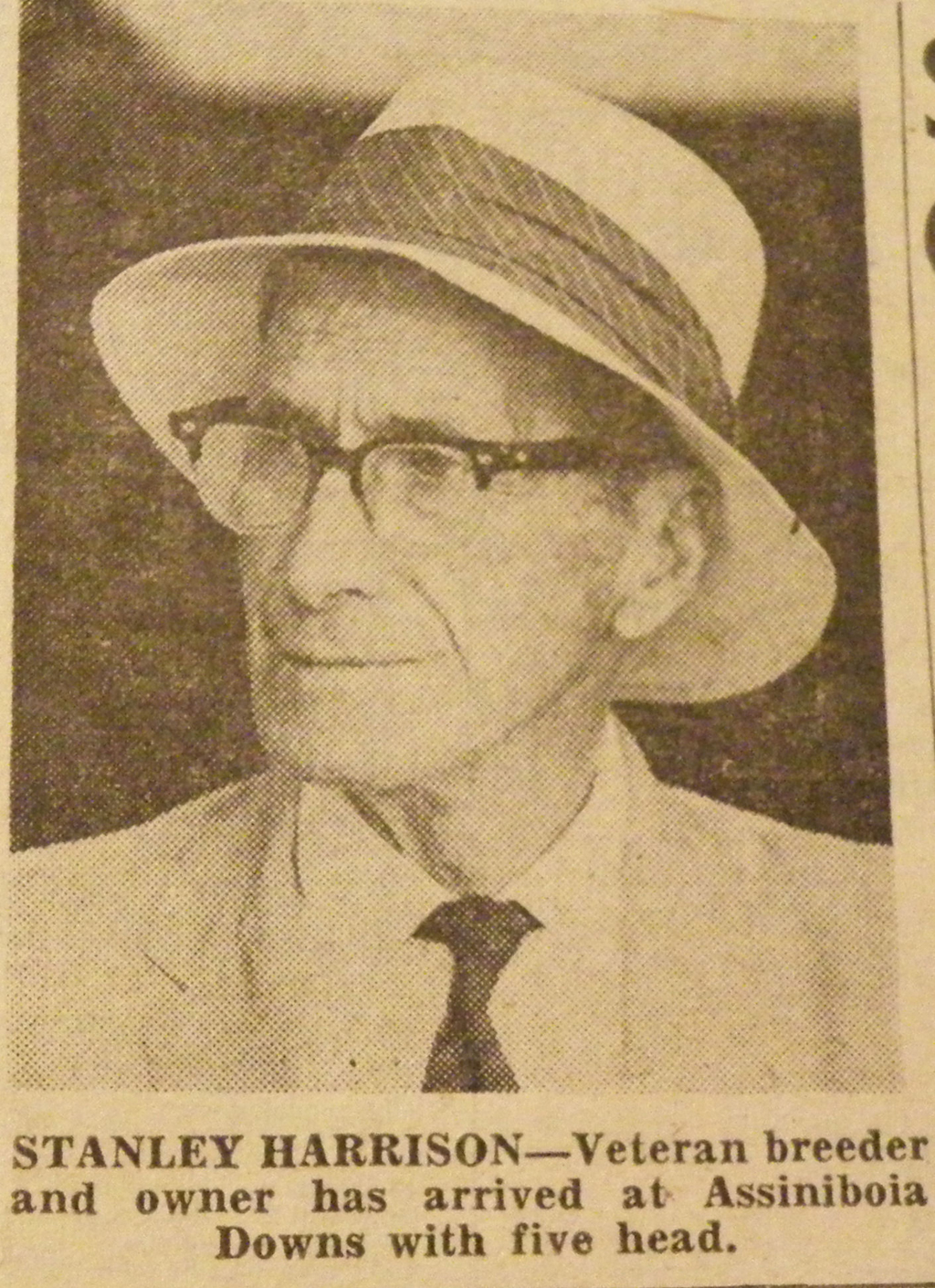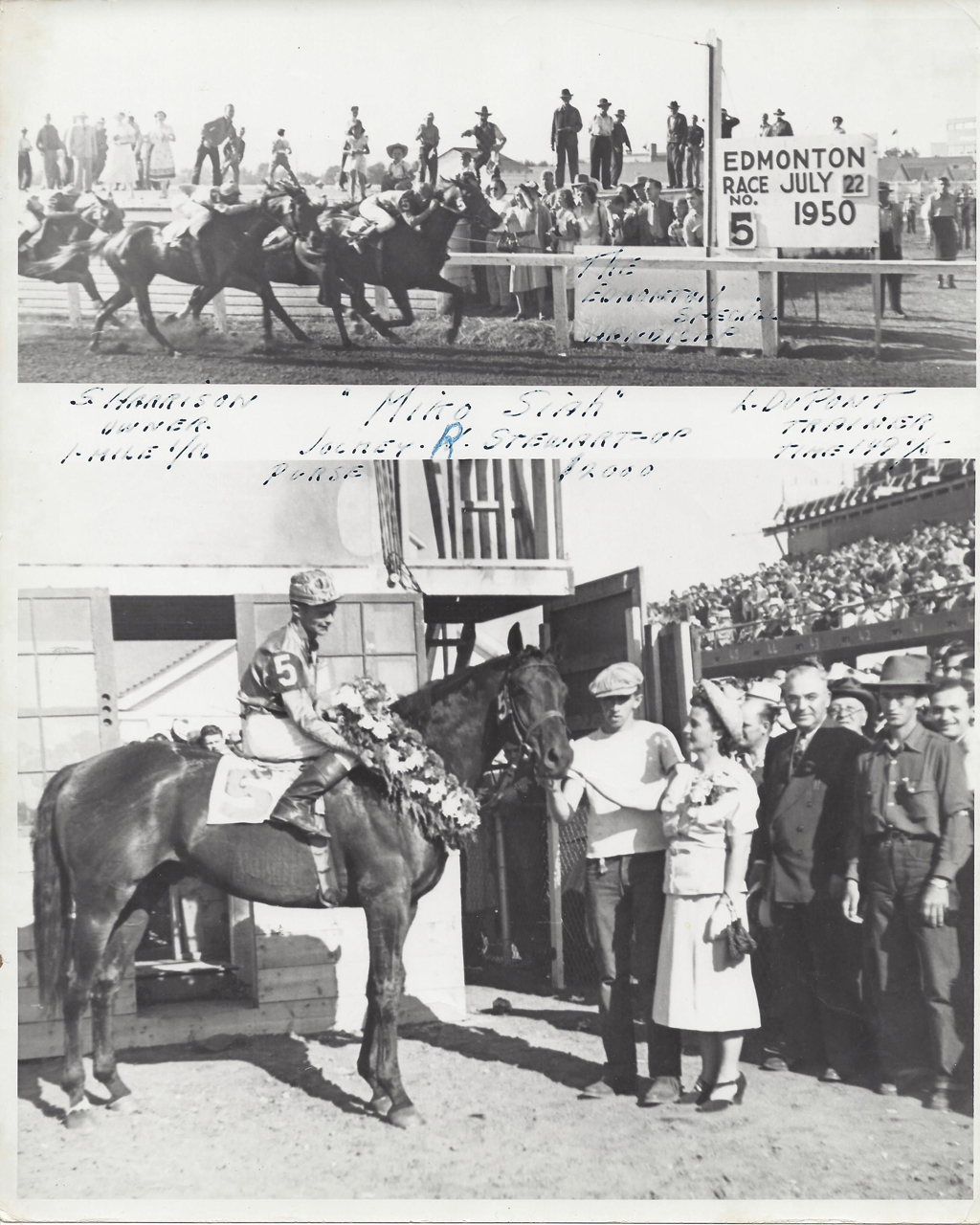
Captain Stanley Harrison winning with Miko Siah.
by Bob Gates
Imagine yourself exploring central Africa much like Henry Morton Stanley in search of missionary and explorer David Livingston and stepping into a clearing from the jungle stands your quarry. Only in this case the phrased uttered is Captain Harrison, I presume?
This is how our own Bobby Nokes envisioned meeting Captain Stanley Harrison. Like David Livingston, Cap Harrison had a mythical status about him. Stanley Gordon Harrison was born in Lancashire England March 24, 1885 and was one of eight children born to James and Annie Harrison. He came to Canada in 1904.
Cap fought and was injured in the Great War. He was with the 27th City of Winnipeg Light Infantry Battalion that went overseas in 1914.
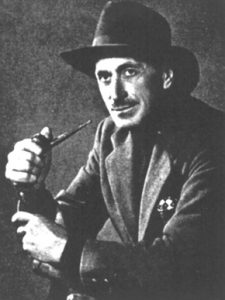
Captain Stanley Harrison. Canadian Horse Racing Hall of Fame Photo.
Harrison, master of the Stockwell Stud in Fort Qu'Appelle, Saskatchewan was a typical Englishman. His Stockwell Stud Farm was a bit of Old England transplanted to the Qu'Appelle Valley. The farm was located on the uplands of the Valley, four miles south of the famous old fort.
He imported broodmares from England to his farm at Fort Qu'Appelle and sought to improve the western Canadian thoroughbred. Harrison did for the west, what E. P. Taylor would do for the east decades later. He was one the most popular horsemen in Canada and a familiar figure at eastern tracks. His lot in life was to see western Canada produce as fine a strain of race horse as any where in North America and abroad.
Captain Harrison was a part of the early days of racing in Winnipeg when Jimmy Speers was the boss of River Park, Whittier Park and Polo Park. Harrison's time racing in Winnipeg is rivaled by no one. He was front and center in 1922 as an owner when the Winnipeg Driving Club had its first meet at River Park that was devoted entirely to "runners." Harrison also raced at Assiniboia Downs until the mid-1970s.
I have the absolute privilege of owning an official program from old River Park from Saturday, June 30, 1923 (please see photo) which came to me from Downs patriarch Bert Blake and to him originally from "Joe Duck." A quick perusal of the sixth race handicap showed that #4, Mutuel No. 5173 was Stockwell Stud's, Merry Marquis. Harrison's colours back then were heliotrope (pink-purple tint), purple sash and cap.
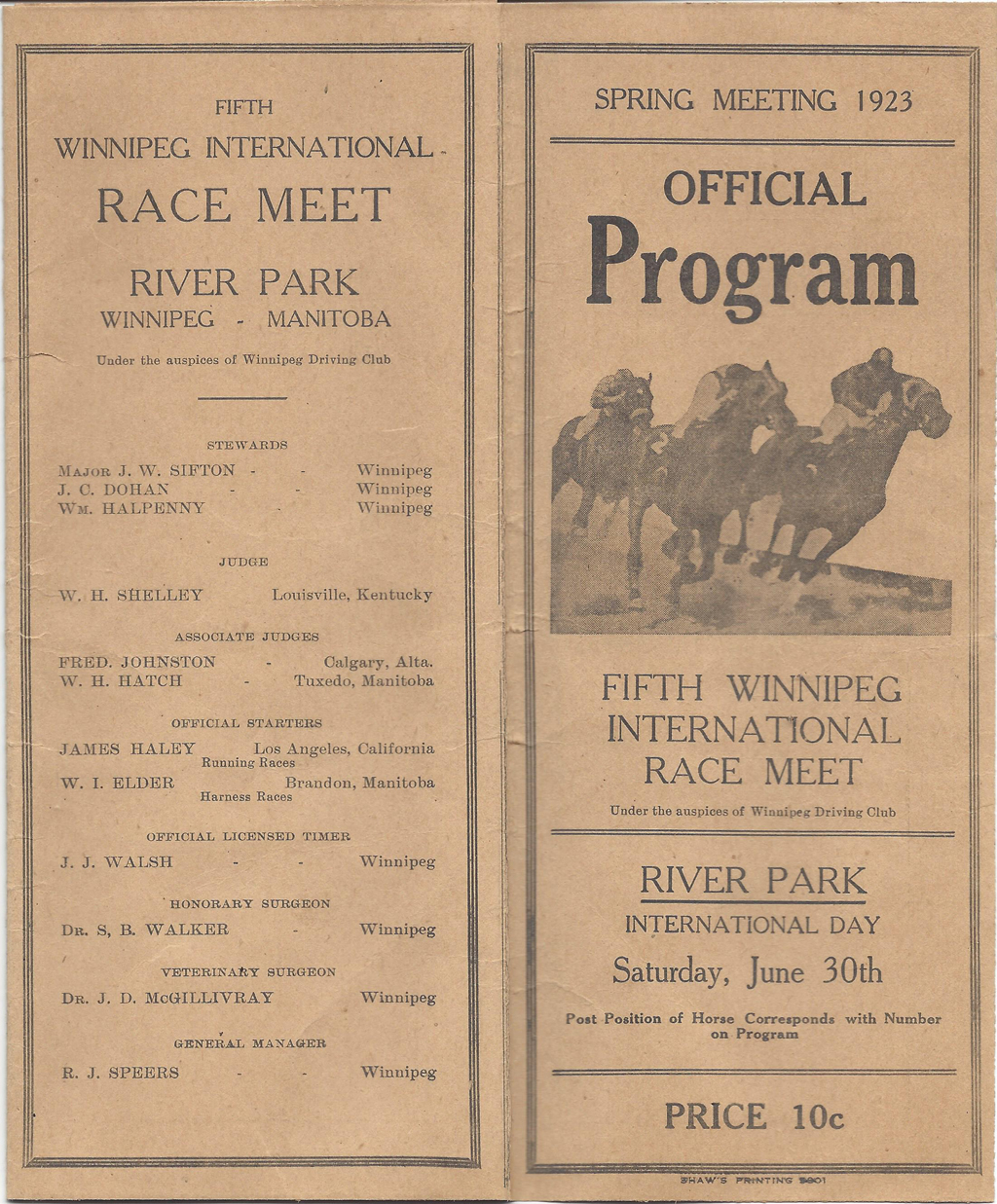 For most of us Cap Harrison's exploits, especially those in the early years of River Park, Whittier Park and Polo Park took place almost a century ago. But I hoped you, the readers of this blog would give Captain Harrison's story a chance even though his iconic years occurred before most of us were born.
For most of us Cap Harrison's exploits, especially those in the early years of River Park, Whittier Park and Polo Park took place almost a century ago. But I hoped you, the readers of this blog would give Captain Harrison's story a chance even though his iconic years occurred before most of us were born.
No one wrote about the history of horse racing in Canada like Jim Coleman. He had a unique style and vocabulary. On occasion I'm convinced he even made up his own words. If you get the chance, be sure to give his book, A Hoofprint On My Heart a read.
Jim had this to say about the man they called "Cap:"
"I can tell you that the first race horse which I appraised at close range was Merry Marquis, owned by Captain Stanley Harrison, the poet laureate of the turf. The confrontation occurred in Edmonton, the summer following our circuitous trip to Qualicum Beach…
Captain Harrison made a practice of nailing portable nameplates on his horses' stall doors. I remember Merry Marquis because he was a stallion and accordingly he occupied the position of honour in the stall adjoining the tackroom in which the groom slept."
Harrison impacted many lives of those who were part of the backside. Here are a couple of examples:
Minnesota's Milo Monroe was a 17-year-old wanna be trainer in 1961 who got the help he needed from Stanley Harrison to get his trainer's licence. At the time Milo was the youngest person to be granted a trainer's licence at Assiniboia Downs.
Brandon's Glenn Wismer was 18 when he started training at the Downs in 1968 and it was Cap Harrison who gave him his first job. Glenn said Cap sent him to the Downs with a few head and a cheque for $500 with the instructions to "watch it." No more money was ever needed. Glenn had drawing privileges on the account from which he paid for the care and feed for the horses. For himself? Not a cent! It was called paying your dues and Wismer was happy to do it. Glenn said he did what he had to do and had the experience of a lifetime.
Glenn paused and on reflection remembered how Cap would get mad at the horses for biting each other. He would scold them in his old English way "You bloody bastards" he would say, but in a non-vulgar, kind-of-way.
I am a sucker for a great quote and Cap Harrison could fill pages with his intelligent and charming thoughts. Old fashion and now somewhat dated, but in so many ways still relevant. When you consider that these musings were made 90 years ago, it's quite amazing. His words serve to add a romantic touch to the racing of these great animals.
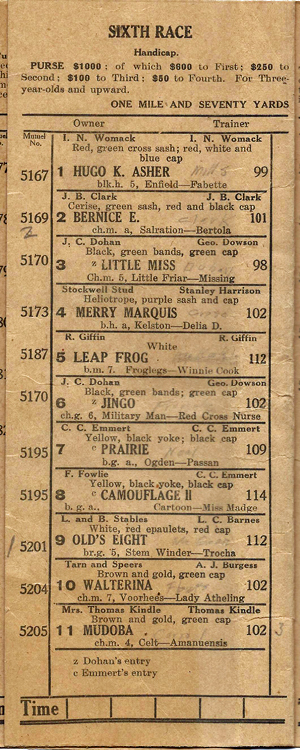 On horses - "They are like us in that there are days when they feel off colour and days when no task seems too big, no demand too great; the latter is when their battery of nervous energy is fully charged, their digestive and muscular system in perfect condition."
On horses - "They are like us in that there are days when they feel off colour and days when no task seems too big, no demand too great; the latter is when their battery of nervous energy is fully charged, their digestive and muscular system in perfect condition."
Owners - "The vast majority of owners do not race horses for the sole purpose of offering the public a betting medium, they race for the value of the purse."
Jockeys - "Good horses make good jockeys, rarely do good jockeys make the horse - though they help tremendously. A lad who rides for a stable will win only when the stable is in condition; when that stable goes off form owing to, say, too much racing or change of climate the same jockey is quite helpless to get them back to winning."
Racing in Winnipeg - "As an example in sportsmanlike conduct efficiency and control. racing in Winnipeg is as good, if not better than anywhere on the American continent. There is greater restraint, chivalry and a more sincere love of horses as apart from gaming element that it has been my fortune to encounter elsewhere."
Racing Generally - "I believe the sport of racing in any country is the best gauge to its national standard of morals and deportment. I am anxious to see our racing achieve its place in the sun as a genuine sport, divorced from selfish commercial interest and adhere steadfastly to the real tradition of the British turf. I think that no man has truly experienced the whole gamut of human emotions unless he has seen a horse of his own breeding win through to hard-won victory."
Harrison was well known for his views on breeding of thoroughbreds. He believed It was the broodmare and not the sire which played the major role in producing an outstanding race horse. He said that the sire dictates the temperament of his offspring and the distance they can run, but it is the mare's blood that carries the racing ability.
Harrison was a founding director of the Prairie Thoroughbred Breeders and Racing Association from 1924 to 1950 and president from 1951 to 1959 when he took on the role of steward at Assiniboia Downs. He was a steward at the Downs, representing the Prairie Thoroughbred Breeders until 1961.
In 1967, the centennial issue of the Canadian Horse magazine selected ten men who they believed did the most for racing in Canada. The list included E. P. Taylor, Sam Perlman, Judge George Schilling, Robert James Speers and Saskatchewan's Captain Stanley Gordon Harrison. Fine company indeed!
In April 1978 Harrison was the first person to represent racing in the Saskatchewan Sports Hall of Fame. Stanley Harrison owner, breeder, trainer, writer/poet, artist and racing official was without doubt Saskatchewan's most outstanding contribution to the sport of thoroughbred racing. He was inducted (as builder) to the Canadian Horse Racing Hall of Fame in 1979.
Harrison passed in January 1980, a few months shy of his 95th birthday. Cap was as much an icon in the sport of racing as has ever existed.
"Somewhere in time's own space
There must be some sweet pastured place
Where creeks sing and tall trees grow
Some paradise where horses go.
For by the love that guides my pen
I know great horses live again."
- Stanley Harrison
… and you just know that Cap Harrison is there tending to each and every one of them.
